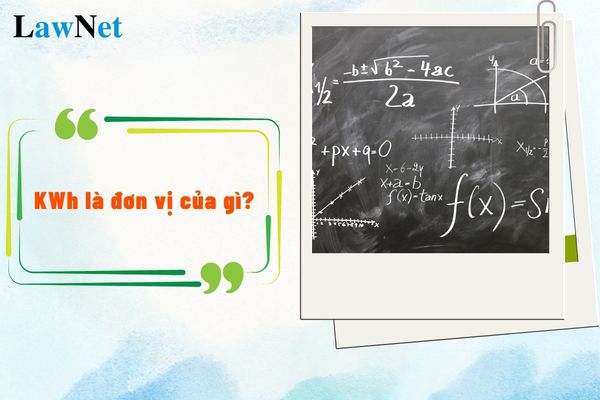Vietnam: What is kWh? What is the content structure of the new Physics program?
In Vietnam, what is kWh?
kWh is a unit of measurement for electrical energy. It indicates the amount of electrical energy consumed by a device over a specified period (typically one hour).
Kilowatt (kW): This is the unit of power, meaning the rate of energy consumption over a unit of time (typically one second).
For example, a 100W light bulb means it consumes 100 joules of energy per second.
Hour: A unit of time.
- When we multiply power (kW) by time (hours), we obtain energy consumption (kWh). For example, if a 100W bulb is turned on for 10 hours, it will consume 100W x 10h = 1000Wh = 1kWh of energy.
Note: Information on what kWh is is for reference only.

Vietnam: What is kWh? What is the content structure of the new Physics program? (Image from the Internet)
What is the content structure of the new Physics program in Vietnam?
Under Section 5 of the General Education Program for Physics issued with Circular 32/2018/TT-BGDDT, the content structure of the new Physics program in Vietnam is specified as follows:
| Content Structure | Grade 10 | Grade 11 | Grade 12 | Notes |
| Introduction | x | |||
| Physics in Various Professions | x | Module 10.1 | ||
| Kinematics | x | |||
| Dynamics | x | |||
| Work, Energy, Power | x | |||
| Momentum | x | |||
| Circular Motion | x | |||
| Deformation of Solid Objects | x | |||
| Earth and Sky | x | Module 10.2 | ||
| Physics with Environmental Education | x | Module 10.3 | ||
| Gravitational Field | x | Module 11.1 | ||
| Oscillation | x | |||
| Wave | x | |||
| Information Transmission by Radio Waves | x | Module 11.2 | ||
| Electric Field (Electromagnetism) | x | |||
| Electric Current, Electric Circuits | x | |||
| Introduction to Electronics | x | Module 11.3 | ||
| Thermal Physics | x | |||
| Ideal Gas | x | |||
| Magnetic Field | x | |||
| Alternating Current | x | Module 12.1 | ||
| Nuclear Physics and Radioactivity | x | |||
| Some Applications of Physics in Medical Diagnostics | x | Module 12.2 | ||
| Quantum Physics | x | Module 12.3 |
What are the specific competencies required for students completing the Physics program in Vietnam?
In Section 4 of the General Education Program for Physics issued with Circular 32/2018/TT-BGDDT, Physics aims to develop students’ physics competency, with specific manifestations as follows:
(1) Physics Cognition
Understanding core common knowledge and skills about: physical system models; energy and waves; forces and fields; recognition of some fields, jobs related to physics; specific manifestations include:
- Recognizing and stating objects, concepts, phenomena, laws, and physical processes.
- Describing phenomena and physical processes; characteristics, roles of phenomena, physical processes using various forms of expression: speaking, writing, measuring, calculating, drawing, diagramming, charting.
- Finding keywords, using scientific terminology, logically connecting information; drafting an outline when reading and presenting scientific texts.
- Comparing, selecting, categorizing, analyzing phenomena, physical processes according to different criteria.
- Explaining relationships between objects, phenomena, processes.
- Identifying errors and correcting perceptions or explanations; making relevant critical judgments related to the discussion topic.
- Recognizing suitable career fields in line with personal tendencies.
(2) Exploring the Natural World from a Physics Perspective
Exploring simple, familiar physical phenomena, processes in life and the natural world; using scientific evidence to verify predictions, explain evidence, drawing conclusions; specific manifestations include:
- Proposing physics-related issues: Recognizing and posing questions related to the issue; analyzing context to propose issues by connecting existing knowledge, experience, and using personal language to express proposed issues.
- Making predictions and formulating hypotheses: Analyzing issues to state predictions; formulating and articulating the hypothesis needing exploration.
- Planning implementation: Creating logical outlines for exploration; selecting suitable methods (observation, experimentation, investigation, interview, information retrieval); drafting exploration plans.
- Implementing plans: Collecting, retaining data from surveys, experiments, investigations; evaluating results based on data analysis using simple statistical parameters; comparing results with hypotheses; explaining, concluding, and adjusting as necessary.
- Writing, presenting reports, and discussing: Using language, drawings, diagrams, tables to express exploration processes and results; writing reports post-exploration; collaborating positively with partners and respecting views and evaluations given by others to actively learn, explain, argue, and defend exploration results convincingly.
- Making decisions and proposing opinions or solutions: Making decisions on the issue explored; recommending the use of exploration or research results, or further research issues.
(3) Applying Learned Knowledge and Skills
Applying learned knowledge and skills in some simple cases; initially using mathematics as a language and tool to solve problems; specific manifestations include:
- Explaining and proving a practical problem.
- Evaluating, critiquing the impact of a practical issue.
- Designing models, planning, proposing, and implementing some new methods or measures.
- Proposing and implementing solutions to protect nature, adapt to climate change; cultivating appropriate behavior and attitudes for sustainable development.
In the Physics Program, each component of the aforementioned general and specific competencies is integrated into each topic, each content strand, in the form of achievable requirements at varying levels.

